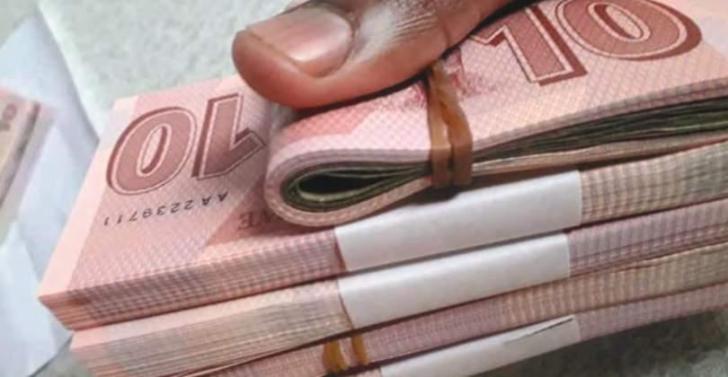News / Local
'Zimdollar will never die'
21 Jun 2023 at 05:24hrs |
1 Views

ZIMNAT Asset Management says the Zimbabwe dollar, which has lost 99% of its value since it was reintroduced in 2019, will not collapse, but rather get relegated to low value transactions.
At the beginning of the week, the Zimbabwe dollar was trading at about $6 713 to the United States dollar on the official market.
On the parallel market, it was trading at around $10 000 to the greenback.
Speaking at the ninth annual convention held by the Actuarial Society of Zimbabwe (ASZ) in Harare recently, Zimnat Asset Management investments general manager Farai Gwaka said the local currency would not collapse.
"Will the Zimbabwe dollar completely collapse? No, it will just get relegated to low value transactions," he said.
He also ruled out full dollarisation of the economy, saying "there is consensus among economists that the country cannot sustain 100% dollarisation", adding that government has been "very clear and consistent on its local currency policy".
The US dollar will be the dominant currency this year, he projected.
Food prices have generally increased across the country, mainly in Zimdollars, following the continued depreciation of the local currency.
The Reserve Bank of Zimbabwe (RBZ) early this month announced various measures aimed at saving the local currency.
These measures include allowing customs duty to be paid in local currency, while Treasury has prohibited the central bank from issuing money to reimburse exporters for their forex export surrender obligations.
The creation of gold tokens, a fictitious cryptocurrency that can be purchased in small units and backed by mining royalty paid for with the metal itself, was another approach.
In order to prevent speculative borrowing and decrease the amount of money in circulation, interest rates were also raised back to 150% from 140%.
All these measures are supposed to create demand for the local currency while also simultaneously reducing money supply which is causing the Zimdollar to lose value as these policies would mop up excess liquidity.
Gwaka said the measure to increase the bank policy rate from 140% to 150% per annum, and also the medium-term bank accommodation interest rate from 70% to 75% per annum, had low probability of success.
He believes that government, however, could have done more, including coming up with interventions to deal with contractor Zimdollar payments.
"There is also no intervention to deal with RBZ loans to the government. No evidence to suggest that Treasury will handle the 25% export surrender requirement better than the RBZ.
"The funding of the Zimdollar to purchase export surrendered amounts was not budgeted for in the 2023 national budget."
He said the key risks to the economy this year included global shocks (Russia, China, inflation, and recession), the 2023 national elections, power outages, policy uncertainty and missteps and liquidity challenges.
At the beginning of the week, the Zimbabwe dollar was trading at about $6 713 to the United States dollar on the official market.
On the parallel market, it was trading at around $10 000 to the greenback.
Speaking at the ninth annual convention held by the Actuarial Society of Zimbabwe (ASZ) in Harare recently, Zimnat Asset Management investments general manager Farai Gwaka said the local currency would not collapse.
"Will the Zimbabwe dollar completely collapse? No, it will just get relegated to low value transactions," he said.
He also ruled out full dollarisation of the economy, saying "there is consensus among economists that the country cannot sustain 100% dollarisation", adding that government has been "very clear and consistent on its local currency policy".
The US dollar will be the dominant currency this year, he projected.
Food prices have generally increased across the country, mainly in Zimdollars, following the continued depreciation of the local currency.
The Reserve Bank of Zimbabwe (RBZ) early this month announced various measures aimed at saving the local currency.
These measures include allowing customs duty to be paid in local currency, while Treasury has prohibited the central bank from issuing money to reimburse exporters for their forex export surrender obligations.
The creation of gold tokens, a fictitious cryptocurrency that can be purchased in small units and backed by mining royalty paid for with the metal itself, was another approach.
In order to prevent speculative borrowing and decrease the amount of money in circulation, interest rates were also raised back to 150% from 140%.
All these measures are supposed to create demand for the local currency while also simultaneously reducing money supply which is causing the Zimdollar to lose value as these policies would mop up excess liquidity.
Gwaka said the measure to increase the bank policy rate from 140% to 150% per annum, and also the medium-term bank accommodation interest rate from 70% to 75% per annum, had low probability of success.
He believes that government, however, could have done more, including coming up with interventions to deal with contractor Zimdollar payments.
"There is also no intervention to deal with RBZ loans to the government. No evidence to suggest that Treasury will handle the 25% export surrender requirement better than the RBZ.
"The funding of the Zimdollar to purchase export surrendered amounts was not budgeted for in the 2023 national budget."
He said the key risks to the economy this year included global shocks (Russia, China, inflation, and recession), the 2023 national elections, power outages, policy uncertainty and missteps and liquidity challenges.
Source - newsday
Join the discussion
Loading comments…































